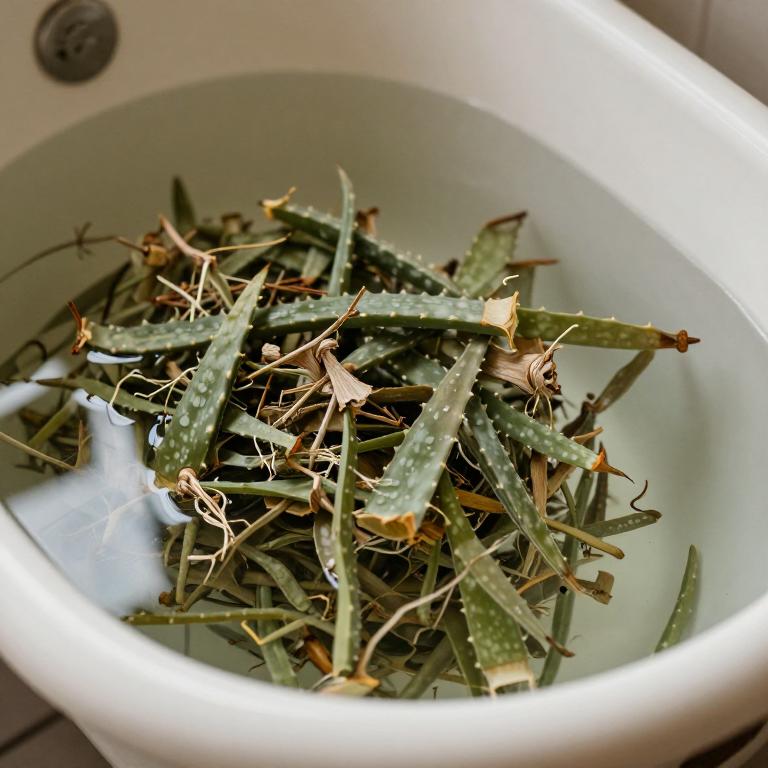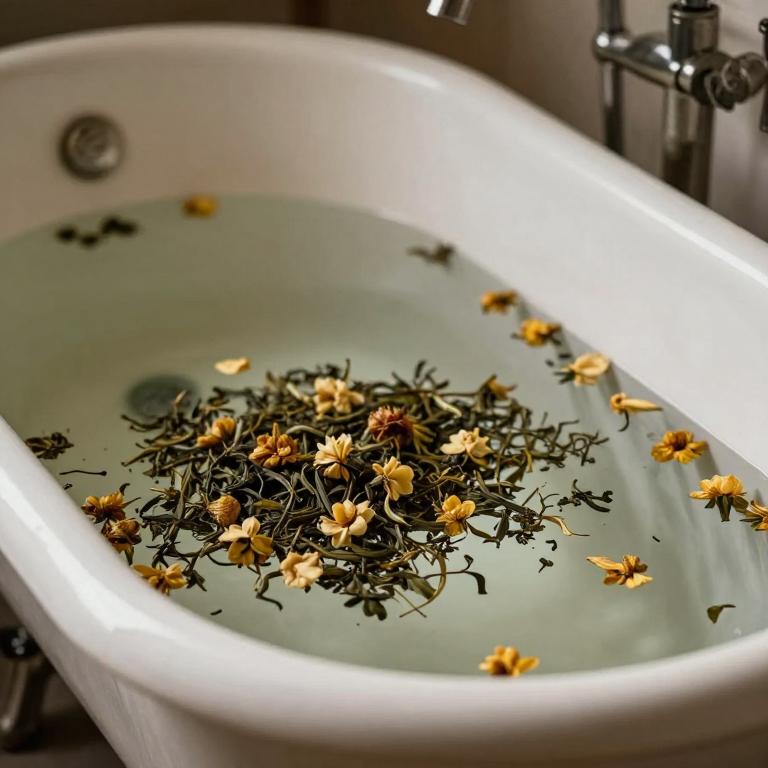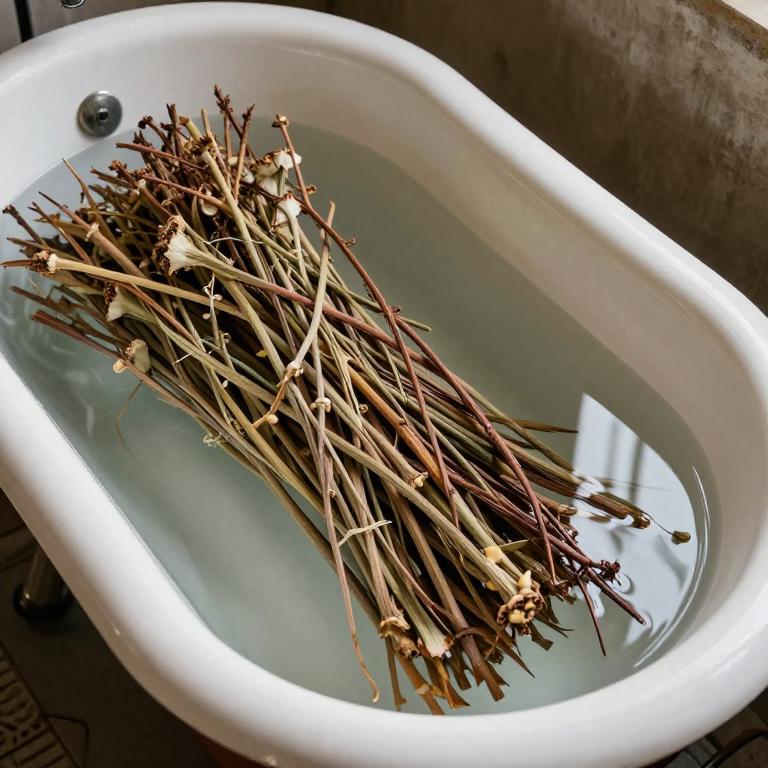10 Best Herbal Baths For Frizzy Hair

Herbal baths for frizzy hair involve soaking the scalp and hair in a mixture of warm water and natural herbs known for their soothing and conditioning properties.
Common herbs used include lavender, chamomile, and nettle, which help to nourish the hair and reduce frizz by balancing moisture and strengthening the hair shaft. These baths can be used weekly to improve hair texture and manageability, especially for those with dry or damaged hair. The aromatic properties of the herbs also provide a calming effect, making the experience both therapeutic and beneficial.
Overall, herbal baths offer a natural and effective way to combat frizz while promoting healthier, more lustrous hair.
Table of Contents
- 1. Field horsetail (Equisetum arvense)
- 2. Rosemary (Rosmarinus officinalis)
- 3. Stinging nettle (Urtica dioica)
- 4. Aloe vera (Aloe barbadensis)
- 5. English lavender (Lavandula angustifolia)
- 6. Salvia (Salvia officinalis)
- 7. Camellia (Camellia sinensis)
- 8. Lemon grass (Cymbopogon citratus)
- 9. St. john's wort (Hypericum perforatum)
- 10. Dog rose (Rosa canina)
1. Field horsetail (Equisetum arvense)

Equisetum arvense, commonly known as horsetail, is a herb rich in silica that is traditionally used in herbal baths to help tame frizzy hair.
The high silica content in horsetail supports the strengthening of hair strands, reducing breakage and improving overall hair texture. When used in a bath, the silica is absorbed through the skin and scalp, promoting healthier, more manageable hair. Herbal baths with horsetail can be prepared by steeping the dried plant in hot water and then using the infused water to rinse the hair after shampooing.
This natural remedy is a gentle and effective way to address frizz and enhance the appearance of hair without the use of harsh chemicals.
2. Rosemary (Rosmarinus officinalis)

Rosmarinus officinalis, commonly known as rosemary, is a versatile herb that has been traditionally used for its beneficial properties in hair care.
When incorporated into herbal baths, rosemary can help reduce frizz by strengthening hair follicles and improving scalp health. The essential oils in rosemary promote circulation, which can lead to healthier hair growth and a smoother texture. To use rosemary in a bath, simply add a few drops of rosemary essential oil to warm water or use a rosemary-infused herbal tea as a rinse after washing hair.
This natural remedy offers a gentle yet effective way to manage frizz and enhance the overall appearance of hair.
3. Stinging nettle (Urtica dioica)

Urtica dioica, commonly known as stinging nettle, has been traditionally used in herbal baths to improve hair health, particularly for those with frizzy hair.
When used in a bath, the leaves release compounds that can help strengthen hair follicles and reduce frizz by balancing the scalp's natural oils. The high silica content in stinging nettle supports hair structure, making it smoother and more manageable. To prepare the bath, fresh or dried nettle leaves can be steeped in hot water and then added to a tub, allowing the steam to infuse the hair with its nutrients.
Regular use of stinging nettle baths may lead to reduced frizz and improved overall hair texture, offering a natural alternative to chemical treatments.
4. Aloe vera (Aloe barbadensis)

Aloe barbadensis, commonly known as aloe vera, is a natural remedy that can be beneficial for those with frizzy hair when used in herbal baths.
The gel from the aloe plant contains nutrients and enzymes that help to moisturize and smooth the hair shaft, reducing frizz and improving overall hair texture. When incorporated into a hair bath, aloe vera can help to detangle hair and enhance shine by sealing the cuticle. Its anti-inflammatory properties also soothe the scalp, promoting healthier hair growth.
For best results, it is recommended to mix aloe vera gel with a small amount of shampoo or water and apply it to damp hair before rinsing thoroughly.
5. English lavender (Lavandula angustifolia)

Lavandula angustifolia, commonly known as English lavender, is a popular herb used in herbal baths for its calming and therapeutic properties.
When infused into bathwater, lavender helps to soothe the scalp and promote relaxation, which can indirectly benefit hair health. The essential oils in lavender have natural antifungal and antibacterial properties that may help reduce scalp irritation and dandruff. Using lavender in a bath can also help to moisturize the hair, making it softer and less prone to frizz.
For those with frizzy hair, incorporating lavender into a regular bath routine may offer a natural way to enhance hair smoothness and manageability.
6. Salvia (Salvia officinalis)

Salvia officinalis, commonly known as sage, has been traditionally used in herbal baths for its potential to improve hair health, particularly for those with frizzy hair.
When infused into bath water, sage can help soothe the scalp and reduce excess oil, which may contribute to frizz by balancing the hair's moisture levels. The anti-inflammatory and antimicrobial properties of sage may also help address scalp conditions that can exacerbate frizz, such as dandruff or irritation. To use sage in a bath, simply steep a handful of fresh or dried sage leaves in hot water for several minutes, then add the infused water to a warm bath and soak for 15 to 20 minutes.
Regular use of sage herbal baths may promote smoother, more manageable hair by enhancing overall scalp and hair health.
7. Camellia (Camellia sinensis)

Camellia sinensis, commonly known as the plant from which green tea is derived, has gained popularity in herbal baths for its potential benefits for frizzy hair.
The tea contains antioxidants and polyphenols that may help strengthen hair strands and reduce frizz by improving scalp health. When used in a bath, camellia sinensis can nourish the hair follicles and promote a smoother, more manageable texture. Its natural properties may also help to soothe an itchy or irritated scalp, which can contribute to frizz.
While more research is needed, many users report that incorporating camellia sinensis into their bathing routine leads to visibly healthier and less frizzy hair.
8. Lemon grass (Cymbopogon citratus)

Cymbopogon citratus, commonly known as lemongrass, is a popular herbal remedy used in natural hair care routines, particularly for managing frizzy hair.
When infused into bath water, lemongrass can help soothe the scalp and reduce excess oil, which is often a contributing factor to frizz. The essential oils in lemongrass have antimicrobial properties that may help prevent scalp infections, promoting healthier hair growth. Regular use of lemongrass herbal baths can improve hair texture and make it more manageable by strengthening the hair shaft.
This natural treatment is a gentle alternative to chemical-based products, offering a calming and aromatic experience while supporting overall hair health.
9. St. john's wort (Hypericum perforatum)

Hypericum perforatum, commonly known as St. John's Wort, has been traditionally used in herbal baths to promote scalp health and reduce frizz.
When infused into bath water, the essential oils and phytochemicals in St. John's Wort can help soothe the scalp and strengthen hair follicles. This herbal bath is believed to improve hair texture by reducing excess oil and moisture, which can lead to frizz. The anti-inflammatory and antioxidant properties of hypericum may also help prevent breakage and enhance overall hair shine.
While it is generally safe for most people, those on medications should consult a healthcare professional before using St. John's Wort baths.
10. Dog rose (Rosa canina)

Rosa canina, also known as rosehip, is a natural remedy that has been used for centuries to promote healthy hair and scalp.
When used in herbal baths, rosehip oil or infusions can help nourish and strengthen hair, reducing frizz and improving overall hair texture. The high concentration of vitamins, particularly vitamin C and E, along with essential fatty acids, makes it effective in moisturizing and protecting the hair from environmental damage. To use rosa canina for frizzy hair, you can add a few drops of rosehip oil to your regular shampoo or mix it into a warm water bath for a soothing scalp treatment.
Regular use of rosa canina herbal baths can lead to smoother, shinier hair with reduced frizziness and improved manageability.